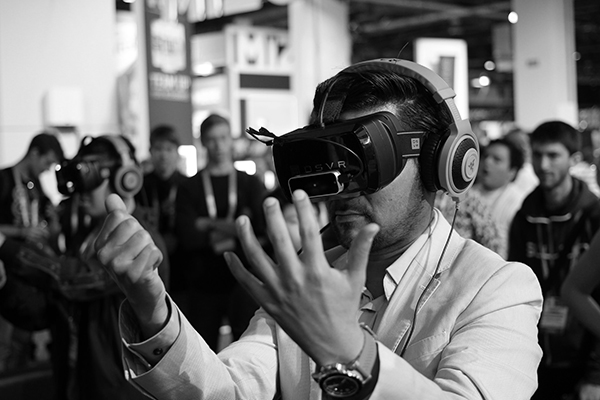In The Inevitable: 12 Technological Forces that will Shape our Future, Kevin Kelly paints a futuristic picture of 12 macro certainties coming together to completely reshape how we live, work and play in the next 15-30 years. Rather than delving into how these forces will materialize (which is less known), he focuses on the forces themselves; noting that while the concept of the internet was inevitable, the kind of internet we chose (public vs. closed, profit vs. nonprofit, national vs. international) was not. His book not only reinforces the importance of brands continually figuring out how to stay relevant, but the excitement that comes with being a part of one of the best times in our history to innovate.
Here’s a brief summary of the 12 forces that Kelly highlights:
 Photo credit: Unsplash user Bethany Legg
Photo credit: Unsplash user Bethany Legg
Becoming: With current technologies consistently upgrading and a significant increase in new technologies to emerge over the next 30 years, we will be in a constant “newbie” state. Kelly notes that this protopia (a constant state of always improving) will be less noted in our everyday lives since it’s much more about marginal improvements over time. This constant state of becoming is partly why today is the best moment in history to create a startup.
 Photo credit: Unsplash user Andy Fitzsimon
Photo credit: Unsplash user Andy Fitzsimon
Cognifying: Similar to when we took any non-electric item and added electricity, the same will be true with artificial intelligence. There will be a boom in businesses that revolve around taking a dumb item and making it smarter with AI, leading to many types of AI all with different capabilities. For example, before electricity, we washed clothes by hand. After electricity, we used a washer and dryer. In the future, clothes will tell the washing machines how to be washed, and the wash cycle will adjust as directed by the clothes. Consider this force in healthcare, where patients outfitted with sensors that track their bio markers 24 hours a day can generate highly personalized treatments that are adjusted and refined daily. While AI can be thought of as scary (as it will replace many jobs), it will realistically help us define which human activities are indispensable. According to Kelly, “The greatest benefit of the arrival of artificial intelligence is that AIs will help define humanity. We need AIs to tell us who we are.”
 Photo credit: Unsplash user Corey Blaz
Photo credit: Unsplash user Corey Blaz
Flowing: Much of our world today is built on copies of an original (think of viral videos, digital music, etc.) which are entirely free. This free flow of copies will continue to expand on a greater scale. While people have tried to stop the free flow, they have not been successful (e.g., Taylor Swift refusing to distribute her music through Spotify has not stopped the success of the subscription service). The implication is not to try and stop the free flow of copies, but rather to find our unique advantage on why our offering is better than free.
 Photo credit: Unsplash user timothy muza
Photo credit: Unsplash user timothy muza
Screening: Today we think of screens in the capacity of our TVs, phones, tablets and computers. The number of screens in our lives will continue to increase, and they will become significantly better at interacting with us via virtual and augmented reality. Consider this scenario: “In the morning, I begin my screening while still in bed. I check the screen on my wrist for the time, my wake-up alarm, and also to see what urgent news and weather scrolls by… As I eat my cereal, I query the screen on the box to see if it’s still fresh and whether the cereal has the genetic markers a friend said it did… At my son’s school, I check one of the public wall displays in the side hallway. I raise my palm and the screen recognizes me. It switches to my personal interface. I can screen my messages if I don’t mind the lack of privacy in the hall.”
 Photo credit: Unsplash user Kevin Fernandez
Photo credit: Unsplash user Kevin Fernandez
Accessing: “Possession is not as important as it once was. Accessing is more important than ever.” The world continues to move away from ownership and toward renting (think of tangible services Uber and AirBnb as well as intangible service like movie streaming, etc). We will continue to see Accessing playing a role, with the Cloud playing a critical role in enabling us to access what we want, when we want it.
 Photo credit: Unsplash user William Iven
Photo credit: Unsplash user William Iven
Sharing: We are entering into a phase of digital “socialism,” where sites like Pinterest rely on people for their power. Within digital socialism, there are levels to this sharing. At its fundamental level, there is the beginning stage of Sharing (posting videos, FB posts, etc). Cooperation takes it to another level, whereby people are working toward a common goal (e.g., sharing their photos but tagging each other for easy sorting). Soon, we’ll see more consistently Collaboration, the idea of generating/working from a stream of thousands of people (e.g. the Linux operating system which underpins most servers and is coordinated by tens of thousands of members).
 Photo credit: Unsplash user freestocks.org
Photo credit: Unsplash user freestocks.org
Filtering: “In our lifetime, the entire library of all books, all games, all movies, every text ever printed will be available 24/7… and every day, the library swells.” With the library of everything continuing to swell, we will need help to sort it in order to make sense of it. While there are many traditional filters that exist today (e.g., retail stores acting as a natural filter by only storing certain items, brand names helping us figure out what to buy, or friend recommendations influencing purchases), we will need more filters simply due to the escalation in quantity of content. Filtering will go beyond “you’ll like this because you viewed this,” and more to a complete personalization; “anywhere we want personalization, filtering will follow.”
 Photo credit: Unsplash user Luke Chesser
Photo credit: Unsplash user Luke Chesser
Remixing: “Modern technologies are combinations of earlier, primitive technologies that have been rearranged and remixed. Since one can combine hundreds of simpler technologies with hundreds of thousands of more complex technologies, there is an unlimited number of possible new technologies–but they are all remixes. We are in a period of productive remixing.” As new technologies emerge and the influx of content comes (with not only artists creating the content, but amateurs as well), we’ll be able to create anything we want. “All these inventions permit any literate person to cut and paste ideas, annotate them with her own thoughts, link them to related ideas, search through vast libraries of work, browse subjects quickly, resequence texts, refine material, remix ideas, quote experts, and sample bits of beloved artists.”
 Photo credit: Creative Commons 2.0 user Maurizio Pesce
Photo credit: Creative Commons 2.0 user Maurizio Pesce
Interacting: The gaming industry has been the primary investor in virtual reality to date, yet VR will expand significantly beyond gaming. The advances in VR will be both in presence (making it feel absolutely real) and interaction (to make it feel like you’re actually interacting with the VR). Growth will come from equipping machines to be able to better interact with us via more sensors. Technology will become our second skin. “A person mumbling to herself while her hands dance in front of her will be the signal in the future that she is working on her computer.” Not just computers, either; all devices will interact. If it doesn’t interact, it will be considered broken.
 Photo credit: Creative Commons 2.0 user Vernon Chan
Photo credit: Creative Commons 2.0 user Vernon Chan
Tracking: We’re on our way to develop 54 billion sensors by 2020. Always-on tracking will continue to explode leading to a more “quantitative self.” For example., rather than a once a year check-up at a doctor, we’ll have all day, every day monitoring of blood sugar, heart rate, etc. “We’ll keep tracking ourselves, we’ll keep tracking our friends, and our friends will track us. Companies and governments will track us more. Fifty years from now ubiquitous tracking will be the norm.” Similar to Accessing, people will try to fight tracking because they are concerned about security. Those who figure out how to normalize tracking will prosper, while those who fight it will not.
 Photo credit: Creative Commons 2.0 user Duncan Hull
Photo credit: Creative Commons 2.0 user Duncan Hull
Questioning: The onset of new technology will always create more questions. Before Google, 50% of Americans used the Yellow Pages once a week. Now, we’re asking Google 4+ times a day for answers. This continual growth in the availability of answers will continue to highlight how much we don’t know, leading to more more thoughtful and complex questions.
 Photo credit: Unsplash user Ian Schneider
Photo credit: Unsplash user Ian Schneider
Beginning: “This is the time when inhabitants of this planet first linked themselves together into one very large thing. Future people will envy us, wishing they could have witnessed the birth that we saw. It was in these years that humans began animating inert objects with tiny bits of intelligence, weaving them into a cloud of machine intelligences and then linking billions of their own minds into this single super mind. This convergence will be recognized as the largest, most complex and most surprising event on the planet until this time.”
So, how should we think about these certain trajectories in the context of innovation? A few implications to consider that will affect our mindset as much as our approach with innovation:
- These forces are inevitable. While we don’t know how they will manifest themselves, a mindset filled with curiosity, acceptance and imagination versus denial and ignorance will be crucial to developing a winning innovation and growth strategy. As you think about the 12 trends, ask yourself, “how can we leverage these forces to create entirely new industries or categories?”
- As Kelly notes, now is potentially one of the greatest times in history to invent because these forces will permeate every aspect of our lives–from how we interact with our children to how we wash our clothes. Our job is to figure out what job these forces could and will solve for in our categories and start inventing.
- Given the notion of our constant “newbie” status, the focus should be less on accumulating knowledge or becoming an expert on a topic and more on a continual, fast-paced sprint that is built on constantly imagining, building and validating new ideas.
The Garage Group helps corporates innovate and grow like startups by helping implement forward-thinking strategies to help brands evolve with our ever-changing technological world.
Photo credit: Creative Commons 2.0 user Markus Spiske


